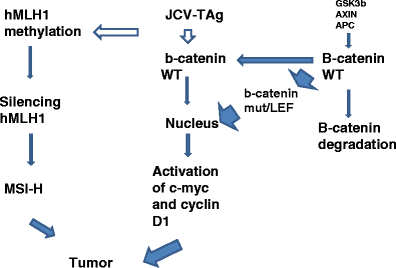Association between hMLH1 hypermethylation and JC virus (JCV) infection in human colorectal cancer (CRC)
- PMID: 22704265
- PMCID: PMC3365371
- DOI: 10.1007/s13148-010-0013-3
Association between hMLH1 hypermethylation and JC virus (JCV) infection in human colorectal cancer (CRC)
Abstract
Incorporation of viral DNA may interfere with the normal sequence of human DNA bases on the genetic level or cause secondary epigenetic changes such as gene promoter methylation or histone acetylation. Colorectal cancer (CRC) is the second leading cause of cancer mortality in the USA. Chromosomal instability (CIN) was established as the key mechanism in cancer development. Later, it was found that CRC results not only from the progressive accumulation of genetic alterations but also from epigenetic changes. JC virus (JCV) is a candidate etiologic factor in sporadic CRC. It may act by stabilizing β-catenin, facilitating its entrance to the cell nucleus, initialing proliferation and cancer development. Diploid CRC cell lines transfected with JCV-containing plasmids developed CIN. This result provides direct experimental evidence for the ability of JCV T-Ag to induce CIN in the genome of colonic epithelial cells. The association of CRC hMLH1 methylation and tumor positivity for JCV was recently documented. JC virus T-Ag DNA sequences were found in 77% of CRCs and are associated with promoter methylation of multiple genes. hMLH1 was methylated in 25 out of 80 CRC patients positive for T-Ag (31%) in comparison with only one out of 11 T-Ag negative cases (9%). Thus, JCV can mediate both CIN and aberrant methylation in CRC. Like other viruses, chronic infection with JCV may induce CRC by different mechanisms which should be further investigated. Thus, gene promoter methylation induced by JCV may be an important process in CRC and the polyp-carcinoma sequence.
Figures
Similar articles
-
Association of JC virus T-antigen expression with the methylator phenotype in sporadic colorectal cancers.Gastroenterology. 2006 Jun;130(7):1950-61. doi: 10.1053/j.gastro.2006.02.061. Gastroenterology. 2006. PMID: 16762618
-
Presence of JC virus DNA in the tumor tissue and normal mucosa of patients with sporadic colorectal cancer (CRC) or with positive family history and Bethesda criteria.Dig Dis Sci. 2012 Jan;57(1):79-84. doi: 10.1007/s10620-011-1855-z. Epub 2011 Aug 10. Dig Dis Sci. 2012. PMID: 21830098
-
hMLH1 promoter methylation and JC virus T antigen presence in the tumor tissue of colorectal cancer Israeli patients of different ethnic groups.Eur J Gastroenterol Hepatol. 2010 Aug;22(8):938-41. doi: 10.1097/MEG.0b013e32832e9d2c. Eur J Gastroenterol Hepatol. 2010. PMID: 20531010
-
JC virus and colorectal cancer: a possible trigger in the chromosomal instability pathways.Curr Opin Gastroenterol. 2005 Jan;21(1):85-9. Curr Opin Gastroenterol. 2005. PMID: 15687890 Review.
-
The Role of the JC Virus in Central Nervous System Tumorigenesis.Int J Mol Sci. 2020 Aug 28;21(17):6236. doi: 10.3390/ijms21176236. Int J Mol Sci. 2020. PMID: 32872288 Free PMC article. Review.
Cited by
-
The Oncogenic Roles of JC Virus T Antigen in Breast Carcinogenesis.Front Mol Biosci. 2021 Aug 12;8:687444. doi: 10.3389/fmolb.2021.687444. eCollection 2021. Front Mol Biosci. 2021. PMID: 34476239 Free PMC article.
-
Leveraging oncovirus-derived antigen against the viral malignancies in adoptive cell therapies.Biomark Res. 2024 Jul 29;12(1):71. doi: 10.1186/s40364-024-00617-6. Biomark Res. 2024. PMID: 39075601 Free PMC article. Review.
-
Epigenetic Inheritance From Normal Origin Cells Can Determine the Aggressive Biology of Tumor-Initiating Cells and Tumor Heterogeneity.Cancer Control. 2022 Jan-Dec;29:10732748221078160. doi: 10.1177/10732748221078160. Cancer Control. 2022. PMID: 35213254 Free PMC article.
-
The oncogenic roles of JC polyomavirus in cancer.Front Oncol. 2022 Sep 23;12:976577. doi: 10.3389/fonc.2022.976577. eCollection 2022. Front Oncol. 2022. PMID: 36212474 Free PMC article. Review.
-
Infection and integration of high-risk human papillomavirus in HPV-associated cancer cells.Med Oncol. 2015 Apr;32(4):109. doi: 10.1007/s12032-015-0560-8. Epub 2015 Mar 8. Med Oncol. 2015. PMID: 25750043
References
LinkOut - more resources
Full Text Sources

